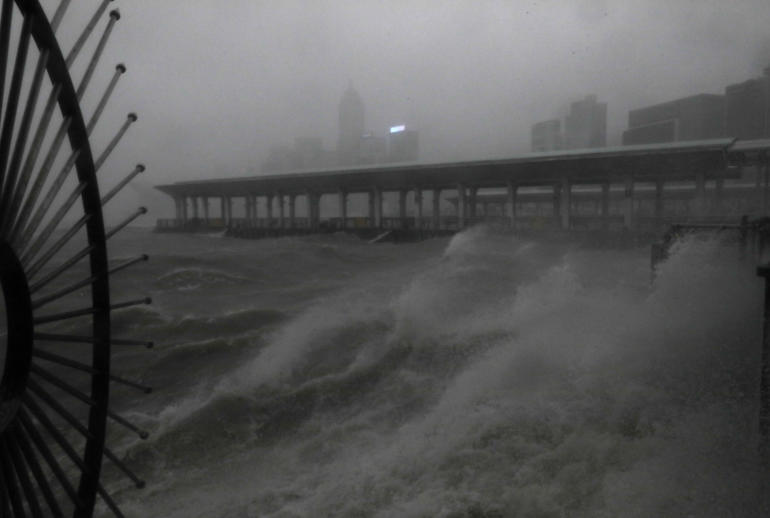Mangkhut weakened from a typhoon to a tropical storm as it moved deeper into southern China on Monday, leaving death and destruction from Hong Kong to the Philippines.
The storm was still affecting southern China’s coast and the provinces of Guangdong, Guangxi and Hainan and rain and strong winds were expected to continue through Tuesday.
Life is gradually returning to normal after the strong storm in Hong Kong and Macau. Rail, airline and ferry services have been restored and casinos in the gambling enclave of Macau have reopened for business. In Hong Kong on Monday, crews were clearing fallen trees and other wreckage left when the financial hub felt the full brunt of the storm on Sunday.
Mangkhut earlier lashed the Philippines, sparking landslides and building collapses that killed at least 65 people, with another 43 missing. Authorities reported four deaths from falling trees and building materials in Guangdong, China’s manufacturing hub.
As of Monday morning Mangkhut was on track to pass over the Guangxi regional capital of Nanning and move toward the border with tourism powerhouse Yunnan province.
The Hong Kong Observatory reported Mangkhut was the most powerful cyclone to hit the city since 1979, packing maximum sustained gusts of 195 kilometers per hour (121 mph).
Typhoon Mangkhut barreled into southern China after lashing the Philippines with strong winds and heavy rain that caused landslides feared to have buried dozens.
More than 2.4 million people had been evacuated in southern China’s Guangdong province by Sunday evening to flee the typhoon, state media said. “Prepare for the worst,” Hong Kong Security Minister John Lee Ka-chiu urged residents.
That warning followed Mangkhut’s devastating march through the northern Philippines on Saturday with sustained winds of 205 kilometers (127 miles) per hour. Landslides caused by the pounding storm hit two villages in Itogon town in the mountain province of Benguet.
Itogon Mayor Victorio Palangdan told The Associated Press by phone that at the height of the typhoon’s onslaught Saturday afternoon, dozens of people, mostly miners and their families, rushed into an old three-story building in the village of Ucab.
The building — a former mining bunkhouse that had been transformed into a chapel — was obliterated when part of a mountain slope collapsed. Three villagers who managed to escape told authorities what happened.
“They thought they were really safe there,” the mayor said Sunday. He expressed sadness that the villagers, many of them poor, had few options to survive in a region where big corporations have profited immensely from gold mines.
The rescue work halted for the night before resuming Monday morning. Men used pikes and shovels to dig into the mud since the soaked ground was unstable and limited the use of heavy equipment on site.
The typhoon was occurring as tropical weather also was devastating the southern U.S. Florence has dumped historical levels of rain on North Carolina.
Mangkhut made landfall in the Guangdong city of Taishan at 5 p.m. Sunday, packing wind speeds of 162 kilometers (100 miles) per hour. CGTN reported that surging waves flooded a seaside hotel in the city of Shenzhen earlier.
The storm shattered glass windows on commercial skyscrapers in Hong Kong, sending sheets of paper pouring out of the buildings, fluttering and spiraling as they headed for the debris-strewn ground, according to videos on social media.
Mangkhut also felled trees, tore scaffolding off buildings under construction and flooded some areas of Hong Kong with waist-high waters, according to the South China Morning Post.
Casinos on Macau were ordered closed for the first time due to the typhoon.
Story by the Associated Press.
 CGTN America
CGTN America Strong wind caused by Typhoon Mangkhut push waves up onto the waterfront of Victoria Habour Hong Kong, Sunday, Sept. 16, 2018. Hong Kong and southern China hunkered down as strong winds and heavy rain from Typhoon Mangkhut lash the densely populated coast. The biggest storm of the year left at least 28 dead from landslides and drownings as it sliced through the northern Philippines. (AP Photo/Vincent Yu)
Strong wind caused by Typhoon Mangkhut push waves up onto the waterfront of Victoria Habour Hong Kong, Sunday, Sept. 16, 2018. Hong Kong and southern China hunkered down as strong winds and heavy rain from Typhoon Mangkhut lash the densely populated coast. The biggest storm of the year left at least 28 dead from landslides and drownings as it sliced through the northern Philippines. (AP Photo/Vincent Yu)
